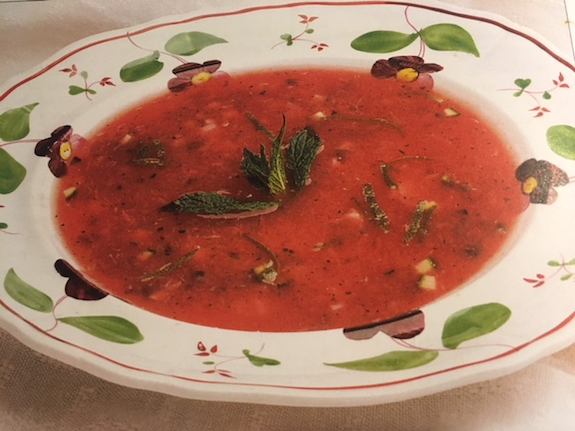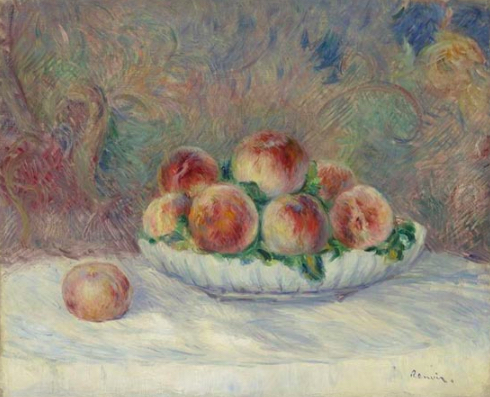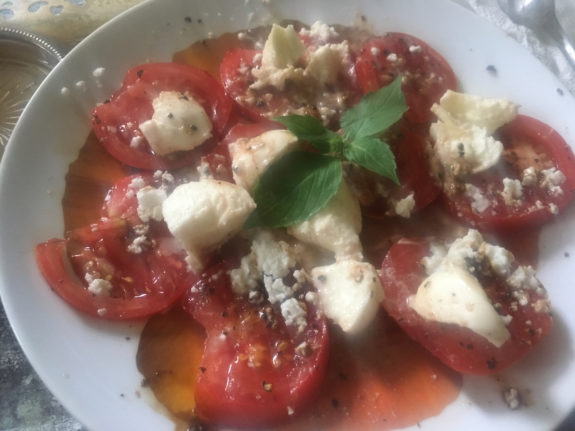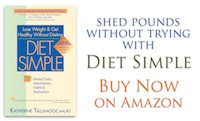Nora Pouillon’s Watermelon Gazpacho with Lime and Mint
Nora Pouillon’s Watermelon Gazpacho with Lime and Mint
6 lbs seedless watermelon, cut up, rind removed
2 Tbs lime juice
2 Tbs lemon juice
1/2 jalapeno (or to taste)
1/2 c chopped red onion
2 minced garlic cloves (optional)
1/3 c packed, minced mint
1 diced zucchini
1 seeded and chopped green bell pepper
salt & pepper
cubed watermelon & fresh mint for garnish
Puree watermelon in batches until smooth. Leave some puree in the blender and add juices, jalepeno, onion and garlic. Puree again till smooth. Add mint and buzz till it’s just chopped.
In a large bowl, mix both purees. Stir in zucchini, green pepper, and watermelon cubes. Add salt & pepper to taste.
serves 4
Adapted from “Cooking with Nora” by Nora Pouillon
Pre-Diabetes is Reversible if You Do Something NOW
- At August 20, 2018
- By Katherine
- In Articles, News
 0
0

World wide diabetes deaths 2012. Red is the highest prevalence, then orange .. with the lightest yellow, the lowest prevalence
Many clients come to me feeling frightened about being diagnosed with “pre-diabetes,” or “borderline diabetes.” Don’t get me wrong, it is a scary diagnosis, as it’s a precurser to full-blown diabetes which could happen any time. But it’s reversible if taken seriously and within a short time frame. If you have it for too long, it becomes permanent diabetes and is not reversible (in some cases, this takes a few months, in others, a few years).
Another name for pre-diabetes is “insulin resistance,” because your body produces enough insulin, the insulin just doesn’t work as designed. The result is high blood glucose (glucose is the sugar found in blood), the same as if you had insulin-dependent diabetes, which means you have an insulin deficiency, and in that case, insulin shots are necessary. But insulin shots are not normally necessary if you just have insulin resistance. That’s because, in the case of insulin resistance, your body is sending out too much insulin – not too little.
Insulin is a hormone whose job it is to carry glucose from the blood to the cells where it is used for energy. After eating, glucose begins rising in the blood stream. Then insulin, produced and secreted by the pancreas, grabs the glucose, keeping it in a healthy range. Insulin’s next job is attaching to receptor sites on the cell wall so glucose can enter. It’s like a lock and key arrangement. Insulin is the key that opens the cell doors (the receptor sites), and lets the glucose in. But in the case of insulin resistance, the doors (or receptor sites) are blocked. The glucose and insulin, both, end up being dangerously high in the blood stream. High blood glucose can put you in a coma and cause death. Long term, it is associated with reduced blood flow, nerve and organ damage. Chronic high blood insulin – insulin is considered a “growth factor” – is associated with heart attack, cancers (especially colon), increases in belly fat and hunger.
Most people think that eating sweets caused their pre-diabetes, so they believe cutting back on sweets will reverse it. But they’re usually wrong. The cause is normally excess body fat (especially belly fat) and/or an inactive lifestyle (if you have the gene for diabetes in the first place). Once you’ve been diagnosed with insulin resistance or pre-diabetes, yes, what you eat makes a difference in the progression of the disease because your body, now, cannot metabolize too much blood glucose. But if all you do when diagnosed is change your diet, your disease will probably not get better, or will more likely, become worse. Instead, losing weight and exercising are the “cures.” The receptor sites become un-blocked and the insulin and glucose can be in normal ranges again.
Peaches! Peaches! More Peaches!
Peaches are so abundant right now, our local Farmers Market is practically giving them away. What to do with all those peaches? Freeze slices for peach smoothies all year long. And lots, lots more!
Katherine’s Summertime Peach Crisp with Roasted Nuts, Dried Fruit & Ginger
Fresh Kale and Summer Peach Salad with Toasted Almonds and Balsamic Vinaigrette
Creamy Summer Peach Fruit Smoothie
Swedish Waffles with Vanilla Bean Yogurt and Fresh Summertime Peaches
Nora Pouillon’s Chilled Cucumber Soup with Yogurt & Cilantro
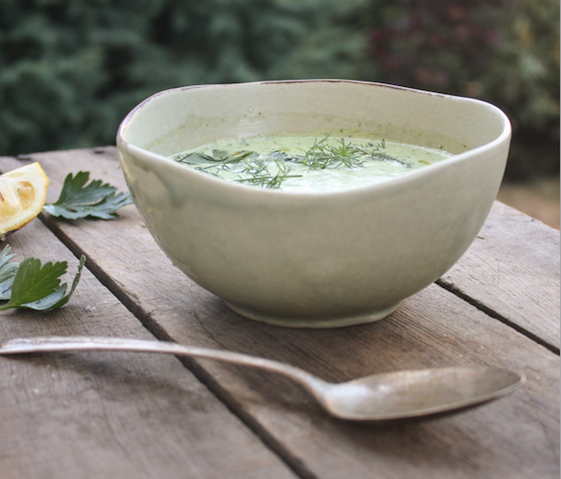 Excerpted from “Diet Simple Farm to Table Recipes: 50 New Reasons to Cook in Season!“
Excerpted from “Diet Simple Farm to Table Recipes: 50 New Reasons to Cook in Season!“
If you’re not sure you’ll like the idea of cold cucumber soup, you will! Give it a try, you won’t be sorry…
4 Servings
3 Cups Lowfat Yogurt
3 Medium Cucumbers, peeled, seeded and cut into chunks
1 Medium Green Pepper, washed, seeded, and cut into chunks
4 – 6 Cloves of Garlic, peeled
Juice of 1 Lemon
Peel of 1 Lemon
1 Tablespoon Olive Oil
1/3 Cup Cilantro Leaves
1 Jalepeno Chili Pepper with seeds, stemmed
1 teaspoon sea salt
Cilantro sprigs, for garnish
Put the yogurt, cucumbers, green pepper, garlic, lemon juice and lemon peel, olive oil, cilantro, and jalapeno in a blender. Puree until smooth. Season to taste with salt and refrigerate.
ASSEMBLY: Pour the chilled soup into 4 bowls, garnish with cilantro.
Calories: 128
Note from Nora: “Since the fruit I use is organic, I always use the skins. I zest or peel my lemons or limes with a vegetables peeler. Then I peel off the white pith from the fruit (you need a sharp paring knife) and put the whole lemon or lime and its peeled skin into the blender.”
Kjerstin’s Swedish Cucumber Salad with Fresh Dill
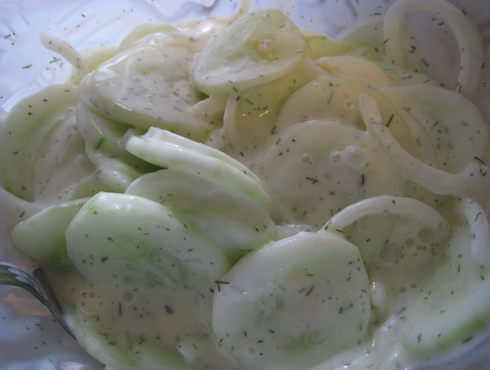 Excerpted from “Diet Simple Farm to Table Recipes: 50 New Reasons to Cook in Season!“
Excerpted from “Diet Simple Farm to Table Recipes: 50 New Reasons to Cook in Season!“
This recipe from my mother is a typical Swedish side dish (though I substituted yogurt for sour cream). When she (and I) serves it at parties, it is always a huge hit. It’s especially delicious using locally grown, just picked cucumbers. It’s great served alongside smoked salmon, but also any spicy dish, such as an Indian Curry.
1 English Cucumber, peeled and thinly sliced (any seasonal cucumber will do)
1 Cup White Wine Vinegar
1 Cup Water
2 Tbsp Salt
1 Tbsp Sugar
1 Tbsp Chopped Fresh Dill
1/2 Cup Low Fat or Nonfat Plain Greek Yogurt
1 Dash Pepper
Mix water, vinegar and salt. Add cucumber slices and let sit for about an hour. Drain well. In clean bowl, mix together yogurt, dill, sugar and pepper. Mix cucumber slices in the yogurt mixture. Let sit in refrigerator for at least one hour to blend flavors. Will last several days in the refrigerator.
Susan Belsinger’s Creamiest Summer Peach Fruit Smoothie
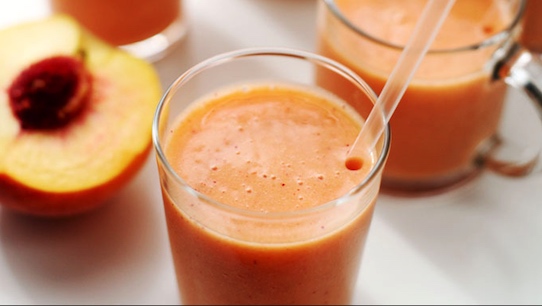 Excerpted from “Diet Simple Farm to Table Recipes: 50 New Reasons to Cook in Season!“
Excerpted from “Diet Simple Farm to Table Recipes: 50 New Reasons to Cook in Season!“
“Another great combo is raspberries with peaches. Besides being quick and easy, the best thing about this recipe is that it tastes good and it is good for you! Sometimes when I know I’m going to be burning a lot of energy—I add a handful of dry oatmeal—if makes it thicker and more filling, adds protein, and keeps me going longer. Just double the recipe if you are making smoothies for two,” says Susan. I’d like to add that soymilk makes extra creamy smoothies. Try it!
Serves 2
About 1 to 1 1/2 cups peaches and/or other fruit, cut into chunks
About 1 tablespoon maple syrup or honey
1 cup cold soy milk
3 to 5 ice cubes
2 drops pure vanilla extract
Put the fruit in the blender. Drizzle the syrup or honey over it. Add the ice cubes. Pour the soy milk over all and add the vanilla. Blend until pureed and frothy. Serve immediately in a tall glass with a straw.
My Favorite 15 Minute – or Less – Summertime Recipes
Summer is my favorite time of year for food that needs NO COOKING!
Fresh Kale & Summer Peach Salad with Toasted Almonds and Balsamic Vinaigrette
Sweet Summertime Melon Chunks with Crumbled Feta & Fresh Mint
Fresh Summer Salsa with Watermelon
Zucchini Ribbons with Fresh Lemon Vinaigrette
Swedish Waffles, Vanilla Bean Yogurt & Fresh Summertime Peaches
Kjerstin’s Chicken Salad with Summer Grapes, Peaches & Toasted Walnuts
Creamiest Summertime Peach Smoothie
Kjerstin’s Cucumber Salad with Fresh Dill
Nora Pouillon’s Chilled Cucumber Soup with Yogurt & Cilantro
The Top 12 Anti-Aging Foods
- At August 11, 2018
- By Katherine
- In Articles, News
 4
4
It’s true. Science tells us you can slow the aging process and live longer, with a higher quality of life and health. Side benefits even include preventing wrinkles and gray hair! Each recommendation has been backed by a decades-long body of scientific evidence.
Yogurt: Possibly the most significant nutrition discovery in decades is all about your gut. The 100 million cells in your gastrointestinal tract, called the “microbiome,” contain bacteria that can make or break your health. Eating a diet with foods (yogurt is a prime example) containing healthy bacteria, called probiotics, boosts your immune system, preventing infection, enhancing immunity, helping prevent diseases from colds to cancer, even diabetes and obesity. Research is also finding that a healthy microbiome may play a role in reducing inflammation, a risk factor involved in illnesses ranging from colds to cancer, heart disease, arthritis and cognitive decline.
Olive Oil: Polyphenols, the nutrients in freshly harvested and carefully handled olive oil, are primarily responsible for its health benefits. They activate genes that reduce your chances for metabolic syndrome, the name for a group of risk factors (high blood pressure, cholesterol, and glucose) that together increase the risk for heart disease, America’s number-one killer. Polyphenols reduce cancer risk by lowering inflammation and cellular proliferation. They act as antioxidants*, reducing oxidation and cell damage, which leads to many degenerative diseases. They even reduce microbial activity and infections.
Tea: The flavonoids in fresh tea help your heart by keeping blood vessels unclogged and flexible, lower blood pressure, improve bone health, and even help your thinking and memory. The compounds called catechins in green tea help you lose weight. The antioxidants* in tea might reduce cancer risk, and an amino acid called L-theanine reduces stress and stress hormones that cause inflammation, dampening your immune system.
Kale: has the highest antioxidant* content of all vegetables. High in fiber, it is rich in minerals, B-vitamins, beta-carotene, and lutein, a compound which may help reduce the risk of age-related macular degeneration (the leading cause of preventable blindness), cataracts, and other eye diseases. Absorption of carotenoids, such as lutein, in your body is increased by cooking and by the presence of fat (so cook in a little healthy olive or canola oil!).
Salmon: Salmon is one of the few food sources of Vitamin D, an essential vitamin usually only obtained from sunshine. It’s a major source of the healthy fats, omega-3-fatty-acids, found in seafood. It’s established that omega-3-fatty-acids reduce inflammation, a risk factor for every disease from colds, heart disease, arthritis, to cancer. Omega-3s favorably effect a number of risk factors for cardiovascular disease and at the top of the list is reducing the risk of sudden death from heart attack. It concentrates in the brain and nervous system and may reduce the incidence of depression, and other conditions like Alzheimer’s Disease and cognitive decline.
Nuts: Nuts and seeds improve signs of biological aging by increasing telomere length. Telomeres, proteins found at the end of each chromosome (think of the plastic protector at the ends of shoe laces), preserve information in our genome and prevent cell death; they serve as a biological clock to determine the lifespan of a cell and an organism. Telomere length shortens with age and can be affected by various lifestyle factors. Shorter telomeres are associated with lower rates of survival and higher rates of disease such as heart disease, cancer, diabetes and osteoporosis.
Black and Blueberries: These fruits are superstars and have the highest level of antioxidants* in the fruit world. They’re high in compounds called anthocyanins, a group of potent plant nutrients, including antioxidants*. Anthocyanins provide the blue pigments in fruits and vegetables. They lower inflammation, and prevent several diseases including heart disease, cancers, diabetes, some metabolic disorders, and infections. They also protect vision and the nervous system.
Dark Chocolate: The most significant contribution of cocoa to health is improved blood flow. Cocoa flavonols, some of the healthy nutrients in cocoa, improve artery dilation, reduce blood clotting and therefore reduce heart disease risk, and lower blood pressure – the pressure on artery walls that prevents blood flow. Thus, flavonols are responsible for increasing oxygen and nutrition to the brain and other organs – improving brain function, among other things. Cocoa also contains polyphenols, another class of healthy nutrients with potent antioxidant* power, decreasing many signs of aging including cognitive decline, loss of memory, and heart disease.
Apples: A rich source of several flavonoid subclasses (healthy plant nutrients), particularly flavonols, anthocyanins, and flavones, are associated with less weight gain. They do it by reducing blood glucose (blood sugar), sending it into the muscles, where it is burned as energy, instead of increasing body fat. Body fat is not inert. It produces toxic chemicals causing inflammation, oxidation, insulin-resistance, and cancer-promoting cell growth. Keeping body fat at bay is associated with increased life span.
Butternut Squash: They’re a bustling factory of nutrients and plant compounds with potent powers of healing. When acting synergistically in a food, these nutrients provide a more powerful health punch than the individual nutrients alone. Some of the most important nutrients in squash are antioxidants*, such as beta-carotene, alpha-carotene and vitamin C, which are powerful substances believed to reduce inflammation, improve immune function and help prevent heart disease and cancers, among other benefits.
Oats: A good source of soluble dietary fiber, especially β‐glucan, oats lower LDL (bad) cholesterol and keep blood glucose at low levels after eating, a low glycemic, anti-diabetic affect not associated with most grains. The nutritional benefits of oats appear to go beyond fiber to biologically active plant nutrients with strong antioxidant* and anti‐inflammatory effects. Foods, such as oats – high in soluble fiber – delay stomach emptying, which increases feelings of fullness and are associated with weight loss. Oats are a prebiotic food, contributing to healthy bacteria in the gut, along with probiotic foods.
Concord Grape Juice or Red Wine: Research shows that Concord grape juice is similar to red wine in many respects. Both are high in a class of beneficial plant nutrients called polyphenols, antioxidants* that protect against heart disease, cancers and other signs of aging. Other polyphenols, called tannins, are responsible for the astringent flavor in cocoa, tea, grapes, and other fruits, are powerful antioxidants*. Concord grape juice and red wine also contain a tiny amount of a polyphenol called resveratrol, primarily in the skin of the grape, which has beneficial effects as anti-aging compounds, reducing oxidative damage, inflammation, telomere shortening and DNA damage. Other polyphenols found in the seed, proanthocyanidins, may also prevent cell proliferation and cardiovascular disease. Another class of antioxidant polyphenols in grapes are called flavonols. Grapes contain the flavonol, quercetin (in apples), and kaempferol (in broccoli), which are thought to reduce cellular proliferation and cancer. One study found that concord grape juice improved thinking ability and spatial memory.
*Antioxidants are compounds that absorb oxygen free radicals — molecules that cause oxidation in the body’s cells. Scientists believe that these molecules cause much of the diseases of aging, such as immune system decline, arthritis, heart disease, cancer and neurological impairments affecting cognition and balance. Think of oxidation as being similar to rusting. Or imagine an apple slice turning brown. By simply adding lemon juice, an antioxidant, the apple’s flesh stays fresh and prevents the browning or oxidation. A similar thing happens in your body. Oxidation is constantly occurring in your cells because of environmental pollutants, smoking, exposure to the sun, heat generated through basic metabolic functioning (digestion, for one), unhealthy diets and other factors. It takes a large supply of antioxidants to counter this.
Kids Eat Right Month: Make Chocolate-Covered Peanut Butter & Oat Balls!
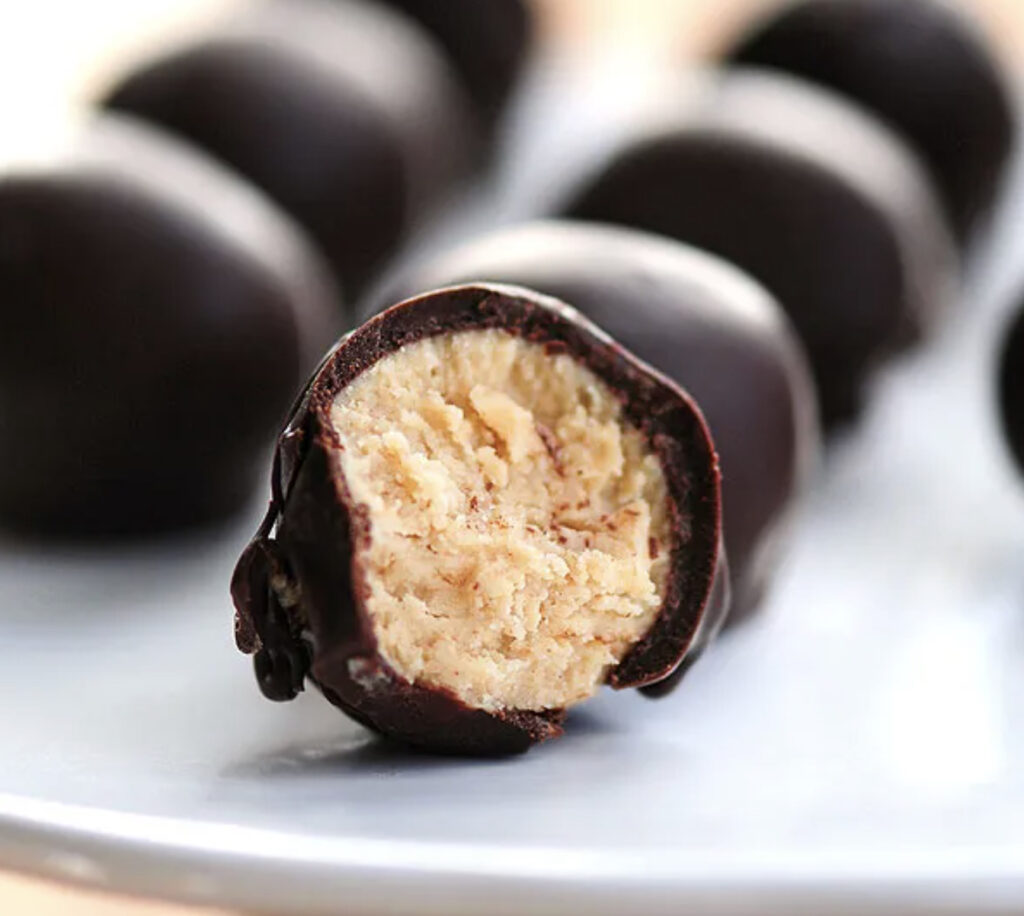
Children aren’t born with healthy eating habits – they learn from their parents. With repetition and practice, healthy eating habits can become a way of life for the entire family.
August is Kids Eat Right Month™, when the Academy of Nutrition and Dietetics and its Foundation focus on the importance of healthful eating and active lifestyles for children and their families.
“Parents raise healthy eaters, bite by bite, meal by meal, as children transition from infants to teens and then to young adults,” said registered dietitian nutritionist and Academy Spokesperson Isabel Maples.
“Raising a competent eater takes years. Start by keeping mealtimes pleasant. Sit down regularly as a family to share meals, because positive attitudes about food grow from that. When there’s joy in eating, good nutrition can follow,” Maples said.
“As children grow, involve them more and more in the responsibility and decision making of meals and snacks. That might mean initiating teachable moments in the grocery store, enlisting your child’s help in planning meals or showing your teen how to prepare afterschool snacks,” Maples said. “Involving kids from the ground up gives them a sense of accomplishment and allows them to gradually develop key life skills about healthful food and good nutrition.”
Maples offers additional healthful eating habits that all families can begin today:
- Allow children to use their internal signals to decide how much to eat,
- Explore a variety of flavors and foods from different cultures and cuisines,
- Make food safety, such as washing hands, a simple part of every eating occasion,
- Teach basic skills for making positive food choices away from home.
“The more involved kids are, the more they will enjoy the fruits of their labors,” Maples said.
Chocolate-Covered Peanut Butter & Oat Bites
1/2 Cup Peanut Butter (or any nut butter you like, such as Almond Butter)
3/4 Cup Old Fashioned Rolled Oats
1 Tablespoon Pure Maple Syrup
1/2 Cup semi-sweet chocolate chips, melted
Natural, Unsweetened Coconut Flakes (optional)
Chopped Roasted Nuts (optional)
Mix oats, peanut butter and maple syrup. You can try this with a wooden spoon, but you’ll probably need to give up on that technique. Go ahead and throw your hands into the task! Your kids will especially love this part.
In the palm of your hand, roll into about 12 balls (the smaller the balls, the more chocolate on each one!) and place them on a baking sheet which is covered with parchment paper. Freeze about 15 minutes or until set.
In the meantime, place the chocolate chips into a microwave-safe bowl. To melt without burning, place in the microwave just 30 seconds at a time, while stirring in-between. You can also melt chocolate safely by doing so in a double boiler.
Roll the bites in the melted chocolate and, if you wish, sprinkle with chopped nuts and/or coconut.
Refrigerate until the bites are set, at least 15 minutes.
Adapted from Eating Well Magazine
Caprese Salad: A Simple Summertime Dish in 5 Minutes
Summertime, when the livin’ is easy… preparin’ meals should be easy too. With an abundance of fresh, natural and locally grown ingredients, there is no need to cook or spend more than five minutes in the kitchen preparing something delectable, mouth-watering, and perfectly balanced nutritionally.
Simply slice some vine-ripe tomatoes on a plate, spread about three ounces of mozzarella (and a touch of goat cheese, if you wish) on top, add a sprig of fresh basil – all from the Farmers Market. Sprinkle fresh extra virgin olive oil, balsamic vinegar, salt and pepper on everything.
Effortless! Only a plate and knife to rinse, and a fork to clean.
Nutritionally, this is a perfectly balanced meal, because it comprises the following four/five elements:
* At least half the plate is a fruit or vegetable,
* It contains 3 ounces of protein,
* The protein source is dairy,
* It’s topped with a heart-healthy fat, the freshest olive oil you can find.
The only element potentially missing is a whole grain. So add a hardy, toasted slice of whole rye or whole wheat bread with a shmear of olive oil and garlic. Or, smother a one cup serving of whole grain pasta with the salad.
Perfetto!

